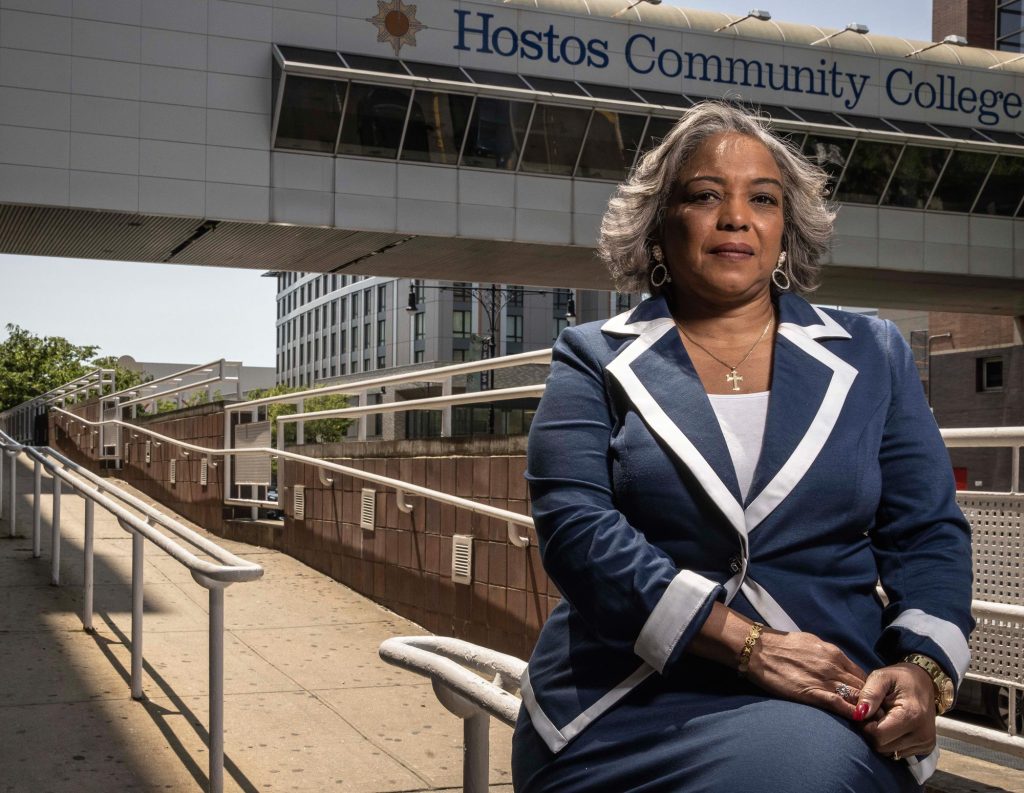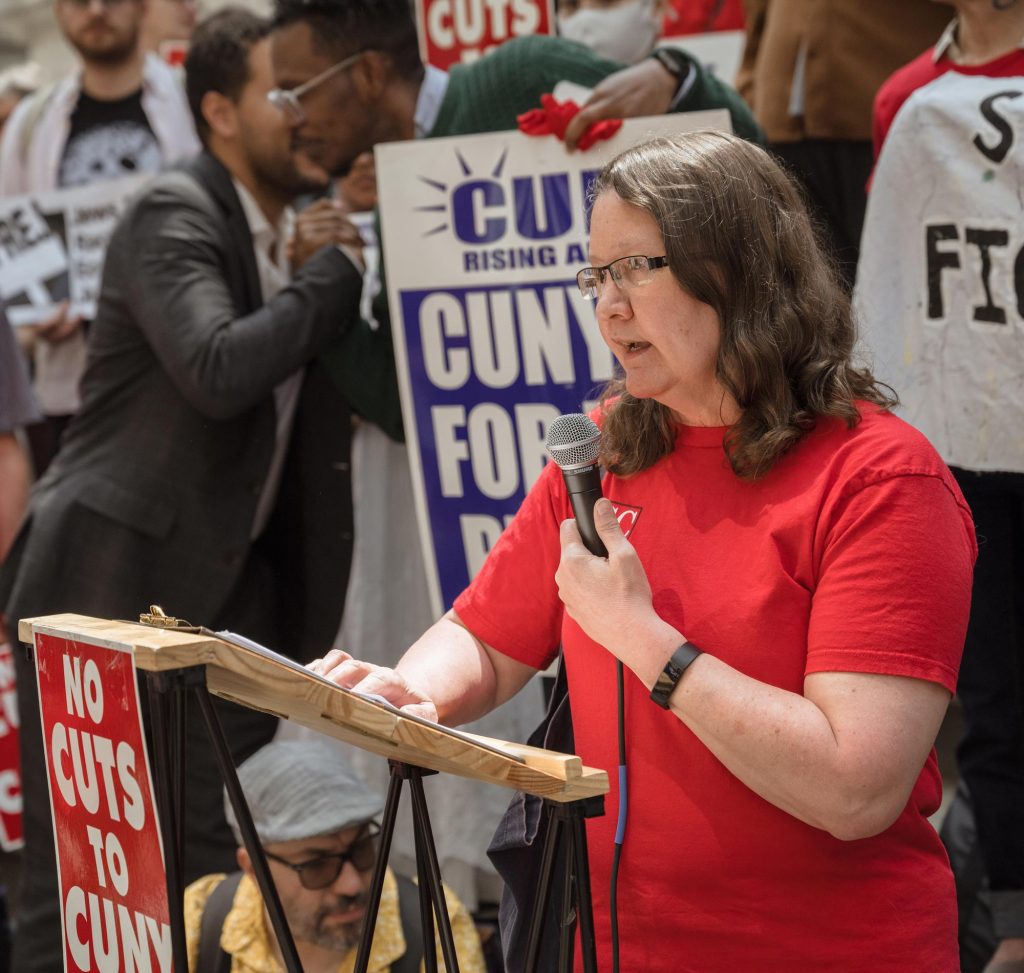
Berkis Cruz-Eusebio, an ASAP career specialist, says more funding is needed to truly serve students. (Credit: Dave Sanders)
Systematic disinvestment in CUNY threatens many of the university’s banner programs. Two in particular, the Accelerated Study in Associate Programs (ASAP) and Accelerate, Complete, and Engage (ACE), offer considerable financial assistance and academic advisement to support students. ASAP’s associate degree model has been replicated across the country, and ACE is itself an analogue to ASAP, but located in the senior colleges. In 2020, Inside Higher Ed reported on a program modeled after ASAP at three Ohio community colleges, saying, “it worked. In fact, it worked admirably. Graduation rates increased significantly and across the board for demographic subgroups. Credit attainment increased. Students’ self-reported stress levels decreased.”
BANNER PROGRAMS
ASAP and ACE funding should be increased, not cut, PSC leaders and members told the City Council Committee on Higher Education on April 20. Their message was particularly urgent because the Adams administration has imposed draconian citywide cuts this year and is demanding more cuts to CUNY in its ongoing budget talks. The city is the primary funder for CUNY’s two-year colleges, and thus, Adams’ austerity regime poses a threat to ASAP. Similarly, the newer ACE program has fragile funding, and without city support could end.
“CUNY has widely advertised the success of ASAP and has exported the model to other community colleges across the country,” said Sharon Utakis, the PSC vice president for community colleges. “To cut funding for it now seems perverse and hypocritical.”
At the April hearing, CUNY Associate Vice Chancellor Alicia Alvero spoke about how invaluable ASAP is.
“At the time the program was launched, CUNY’s overall three-year community college graduation rate was 13%, just shy of the national urban community college graduation rate of 16%,” she said. “ASAP has consistently not only met, but also exceeded, its ambitious graduation goals. To date, ASAP has served more than 88,000 students across 16 cohorts and has an average three-year graduation rate of 53% versus 25% for similar students not in ASAP. The program benefits all subgroups of students, and based on CUNY’s analysis, narrows existing equity gaps for Black and Hispanic males.”
MORE FUNDING
PSC Secretary Penny Lewis testified that ASAP and ACE must continue to receive robust funding in order to flourish. “The high retention and completion rates of ASAP are due, in large part, to the resources it devotes to advisement. The $35.5 million in the Council’s budget response will help ASAP and programs like it expand, by hiring 264 full-time advisors,” she said. “Because so many CUNY students are in the first generation of their families to attend college, advisors are essential in helping students navigate the labyrinth of a large university system.”
Victoria O’Shea, who has worked as an ASAP student advisor at Queensborough Community College (QCC) since 2012, told the panel that budget cuts have taken a toll.
“It has become increasingly more difficult to meet our goal of graduating 50% of our students within three years, primarily because we are incapable of providing the support and opportunities that we once did,” she said in written testimony. “When I started working for ASAP, we were able to provide numerous activities for students, including Broadway show trips, trips to a variety of businesses (so students could learn about different types of careers), ASAP sections of classes (smaller size and meetings with professors), ASAP orientations with outside groups, as well as numerous on-campus activities. What this provided was exposure to experiences that students may not normally have and a more hands-on college experience.”
But these gains have deteriorated with lack of support, O’Shea said.
“With the decline of funding over the years, we have seen a significant drop in student graduation rates. Without the extra experiences and events, students lack the connection to the college, peers, and ASAP,” she said. “With the reduction in our budget in December 2022, we were unable to provide funding for all students taking winter section courses and were unable to provide book stipends or MetroCards for these students as well. For several students, this led to them being unable to successfully complete their winter course(s). We’ve already begun to tell our students to expect the same for summer.”

Sharon Utakis, PSC vice president for community colleges, says ASAP is a proven program to support students. (Credit: Scott Heins)
DIRECTED ADVISEMENT
Salvatore Pisciotta, another ASAP advisor at QCC said through one-on-one meetings, personalized advisement and holistic conversations, ASAP serves as a vital resource for first-generation college students.
“I have worked with many students who have begun their journey doubting whether college was for them or feeling like they did not belong,” Pisciotta said. “By the time of graduation, these students felt that they not only belonged in college, but they also saw vast improvements in academic achievement, interpersonal skills and confidence. Many of our students go on to study for their bachelor’s degrees. They take part in internship experiences, and they obtain admission into competitive programs. They leave ASAP with a plan and a direction.”
Pisciotta added, “Compared to non-ASAP students, we see greater levels of retention, graduation and academic achievement. While the COVID-19 pandemic has undoubtedly hurt enrollment figures, Queensborough ASAP is still serving thousands of students. As of 2020–2021 data, Queensborough is one of the most diverse campuses in the United States, with 31% of new students identifying as Black, 29% Hispanic, and 23% Asian/Pacific Islander.”
INCREASED CASELOAD
Berkis Cruz-Eusebio, a career specialist in ASAP at Hostos Community College, also spoke of hardships for the workforce.
“My current caseload is 940 students with a projected 550 new students starting college in Fall 2023,” she said. “My position no longer involves job placement as it is a conflict with academic retention and degree completion. Nonetheless students’ basic needs need to be covered. If there are cuts to the budget, what kind of quality service am I expected to provide to 1,400-plus students in 35 hours per week? In fact, ASAP needs more career specialists that prepare students to join the workforce as opposed to the benefits’ dependent rolls.”
Published: June 21, 2023 | Last Modified: June 22, 2023

